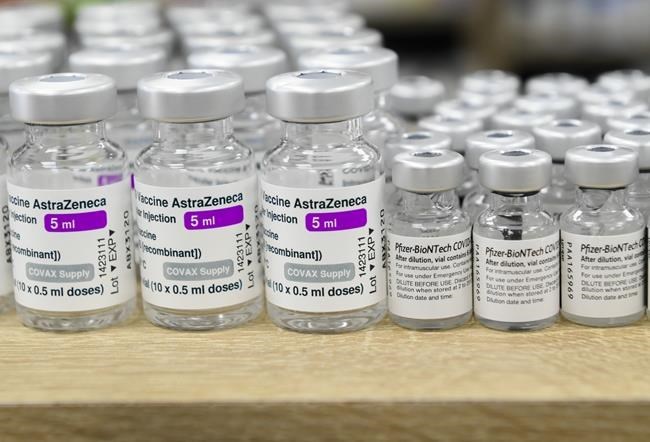OTTAWA — Canada will donate nearly 18 million doses of the Oxford-AstraZeneca vaccine to poorer countries, but is keeping millions of extra doses of mRNA vaccines for potential boosters as the World Health Organization is urging more generosity to stamp out COVID-19 around the globe.
"While Canadians continue to lead the world in vaccine administration, we know that the picture is very different in many places around the world," Procurement Minister Anita Anand said Monday. "We also know that this pandemic will not end until it ends everywhere."
She said that after talking to the provinces, the federal government determined these vaccine doses were excess supply, as demand for the AstraZeneca vaccine had been met. She said Canada will donate 17.7 million doses that were supposed to flow into Canada from the United States through an advance purchase agreement with AstraZeneca.
They will be made available to lower-income countries through the global vaccine-sharing alliance COVAX. The timing is still being worked out.
At the G7 last month, Prime Minister Justin Trudeau also pledged Canada would give back 13 million doses it was set to receive through a contract with COVAX, on top of millions of dollars already set aside for the global vaccine effort.
Canada had secured 20 million doses of the AstraZeneca vaccine through that advance purchase agreement, but demand for that vaccine has dropped drastically as the supply of the mRNA vaccines produced by Pfizer-BioNTech and Moderna has increased.
The National Advisory Committee on Immunization says mRNA vaccines are preferred over the viral-vector vaccines produced by AstraZeneca and Johnson & Johnson, even for people who received AstraZeneca as a first dose.
Viral-vector vaccines are associated with a rare but sometimes fatal blood-clotting disorder, which was found to occur in one in 60,000 AstraZeneca recipients in Canada.
Canada is on track to receive 68 million doses by the end of July, which would be enough to fully vaccinate most of its population of 38 million. Children under the age of 12 are not currently eligible for a COVID-19 vaccine.
At Monday's announcement, Anand says 44 million doses of Moderna and 51 million shots from Pfizer-BioNTech are expected to have arrived in the country by the end of September.
The World Health Organization, meanwhile, is pushing vaccine manufacturers to prioritize supplying COVID-19 vaccines to lower-income countries where the novel coronavirus and its variants are still spreading among a largely unvaccinated population.
"The global gap in vaccine supply is hugely uneven and inequitable," WHO director-general Tedros Adhanom Ghebreyesus told a news conference Monday.
"Some countries and regions are actually ordering millions of booster doses, before other countries have had supplies to vaccinate their health workers and most vulnerable."
It's unclear when, or whether, Canadians will need to get a third dose of vaccine, but it is one reason Anand gave for why there are currently no plans to donate Pfizer or Moderna doses.
"We are still watching the science evolve in this area in terms of the potential need for an additional third shot or boosters, and so we are making sure that we have the supply on hand of these vaccines to be able to serve the needs of Canadians in the short and the long term," she said. "Any decision on the donation of doses needs to be made by the Public Health Agency of Canada in co-ordination with the provinces and territories."
Pfizer said recently it has seen a bit of a dip in antibodies in Israel six months after vaccination and intends to ask the U.S. and Europe to approve giving a booster shot. A Pfizer Canada spokeswoman said it's too early to comment on whether the company will ask the same here.
Health Canada and the federal public health agency issued a joint statement last Friday saying the duration of protection from COVID-19 vaccines is still being studied but current data "shows good immunity in most people out to 9 months after receiving 2 vaccine doses."
The statement said the issue of needing boosters is top of mind for both organizations, and decisions will be based on scientific evidence. In April, Canada announced a deal to get 35 million booster shots from Pfizer in 2022, and another 30 million in 2023, in case they are needed.
"We have ordered way more vaccines than we will need, and we shouldn’t leave the excess in warehouses while most of the world does not have enough," said Stuart Hickox, Canadian director for ONE, an international advocacy organization aimed at fighting extreme poverty, in a statement on Monday.
To keep up with its commitment to help vaccinate less wealthy nations, theLiberal government also announced Monday it would match donations Canadians make to a UNICEF fundraising campaign called "Give a Vax," for a contribution of up to $10 million.
David Morley, the head of UNICEF Canada, says the money raised will pay for transportation and some of the other logistical needs to deliver vaccines to people.
International Development Minister Karina Gould says she's heard Canadians want to help be part of the global COVID-19 vaccination effort.
"As Canadians are hearing more about the Delta and the Lambda variant, recognizing that if the pandemic continues to rage in other parts of the world, that's more opportunities for variants and mutations to emerge," she said in an interview with The Canadian Press.
This report by The Canadian Press was first published July 12, 2021.
— With files from Mia Rabson
Stephanie Taylor, The Canadian Press


